
Caesar Augustus was the first Roman emperor, reigning from 27 BC until his death in AD 14. His status as the founder of the Roman Principate has consolidated an enduring legacy as one of the most effective and controversial leaders in human history. The reign of Augustus initiated an era of relative peace known as the Pax Romana. The Roman world was largely free from large-scale conflict for more than two centuries, despite continuous wars of imperial expansion on the Empire's frontiers and the year-long civil war known as the "Year of the Four Emperors" over the imperial succession.
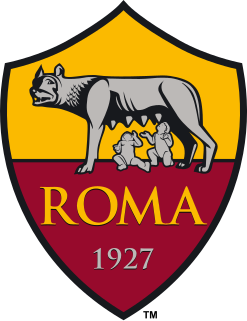
Associazione Sportiva Roma, commonly referred to as Roma, is an Italian professional football club based in Rome. Founded by a merger in 1927, Roma have participated in the top-tier of Italian football for all of their existence except for 1951–52 season. Roma have won Serie A three times, in 1941–42, 1982–83 and 2000–01, as well as winning nine Coppa Italia titles and two Supercoppa Italiana titles. In European competitions, Roma won the Inter-Cities Fairs Cup in 1960–61 and were runners-up in the 1983–84 European Cup and the 1990–91 UEFA Cup.
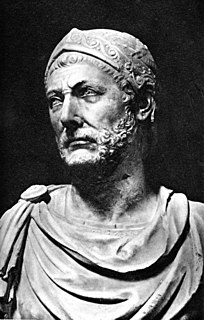
Hannibal was a Carthaginian general and statesman who commanded Carthage's main forces against the Roman Republic during the Second Punic War. He is widely considered one of the greatest military commanders in human history. His father, Hamilcar Barca, was a leading Carthaginian commander during the First Punic War. His younger brothers were Mago and Hasdrubal, and he was brother-in-law to Hasdrubal the Fair, who also commanded Carthaginian armies.

Foreign relations of the Italian Republic are the Italian government's external relations with the outside world. Located in Europe, Italy has been considered a major Western power since its unification in 1861. Its main allies are the NATO countries and the EU states, two entities of which Italy is a founding member.

Pope Gregory XI was head of the Catholic Church from 30 December 1370 to his death in 1378. He was the seventh and last Avignon pope and the most recent French pope recognized by the modern Catholic Church. In 1377, Gregory XI returned the Papal court to Rome, ending nearly 70 years of papal residency in Avignon, France. His death shortly after was followed by the Western Schism involving two Avignon-based antipopes.

Rome is the capital city and a special comune of Italy, as well as the capital of the Lazio region. The city has been a major human settlement for almost three millennia. With 2,860,009 residents in 1,285 km2 (496.1 sq mi), it is also the country's most populated comune. It is the third most populous city in the European Union by population within city limits. It is the centre of the Metropolitan City of Rome, which has a population of 4,355,725 residents, thus making it the most populous metropolitan city in Italy. Its metropolitan area is the third-most populous within Italy. Rome is located in the central-western portion of the Italian Peninsula, within Lazio (Latium), along the shores of the Tiber. Vatican City is an independent country inside the city boundaries of Rome, the only existing example of a country within a city; for this reason Rome has sometimes been defined as the capital of two states.

Vatican City, officially the Vatican City State, is the Holy See's independent city state, an enclave within Rome, Italy. The Vatican City State, also known as The Vatican, became independent from Italy with the Lateran Treaty (1929), and it is a distinct territory under "full ownership, exclusive dominion, and sovereign authority and jurisdiction" of the Holy See, itself a sovereign entity of international law, which maintains the city state's temporal, diplomatic, and spiritual independence. With an area of 49 hectares and a population of about 825, it is the smallest state in the world by both area and population. As governed by the Holy See, the Vatican City State is an ecclesiastical or sacerdotal-monarchical state ruled by the pope who is the bishop of Rome and head of the Catholic Church. The highest state functionaries are all Catholic clergy of various national origins. After the Avignon Papacy (1309–1437), the popes have mainly resided at the Apostolic Palace within what is now Vatican City, although at times residing instead in the Quirinal Palace in Rome or elsewhere.
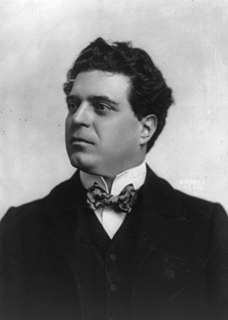
Pietro Mascagni was an Italian composer primarily known for his operas. His 1890 masterpiece Cavalleria rusticana caused one of the greatest sensations in opera history and single-handedly ushered in the Verismo movement in Italian dramatic music. While it was often held that Mascagni, like Ruggiero Leoncavallo, was a "one-opera man" who could never repeat his first success, L'amico Fritz and Iris have remained in the repertoire in Europe since their premieres.

The tale of the founding of Rome is recounted in traditional stories handed down by the ancient Romans themselves as the earliest history of their city in terms of legend and myth. The most familiar of these myths, and perhaps the most famous of all Roman myths, is the story of Romulus and Remus, twins who were suckled by a she-wolf as infants. Another account, set earlier in time, claims that the Roman people are descended from Trojan War hero Aeneas, who escaped to Italy after the war, and whose son, Iulus, was the ancestor of the family of Julius Caesar. The archaeological evidence of human occupation of the area of modern-day Rome, Italy dates from about 14,000 years ago.

Italian unification, also known as the Risorgimento, was the 19th-century political and social movement that resulted in the consolidation of different states of the Italian Peninsula into a single state, the Kingdom of Italy. Inspired by the rebellions in the 1820s and 1830s against the outcome of the Congress of Vienna, the unification process was precipitated by the revolutions of 1848, and reached completion in 1871, when Rome was officially designated the capital of the Kingdom of Italy.
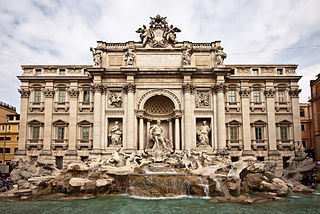
The Trevi Fountain is a fountain in the Trevi district in Rome, Italy, designed by Italian architect Nicola Salvi and completed by Giuseppe Pannini and several others. Standing 26.3 metres (86 ft) high and 49.15 metres (161.3 ft) wide, it is the largest Baroque fountain in the city and one of the most famous fountains in the world.

The Sack of Rome, then part of the Papal States, on 6 May 1527 was carried out by the mutinous troops of Charles V, Holy Roman Emperor during the War of the League of Cognac. The largely Protestant German Landsknechts, mutinying over unpaid wages, as well as Spanish soldiers and Italian mercenaries, entered the city of Rome, defeated the vastly outnumbered defenders, and looted the city. The sack debilitated the League of Cognac, an alliance formed by France, Milan, Venice, Florence and the Papacy against Charles V. Pope Clement VII took refuge in Castel Sant'Angelo after the Swiss Guard were annihilated in a delaying rearguard action, where he remained until a ransom was paid to the pillagers. Benvenuto Cellini, eyewitness to the events, described the sack in his works.

The Roman Republic was proclaimed on 15 February 1798 after Louis-Alexandre Berthier, a general of Napoleon, had invaded the city of Rome on 10 February. The republic became one of the Italian "sister republics" of Revolutionary France. It was placed under the government of France - the Directory - and comprised territory conquered from the Papal States. Pope Pius VI was exiled to France and died there in August 1799. The republic immediately took control of the other two former-papal revolutionary administrations, the Tiberina Republic and the Anconine Republic. The Roman Republic proved short-lived, as Neapolitan troops restored the Papal States in October 1799.

Civitavecchia is a city and comune of the Metropolitan City of Rome in the central Italian region of Lazio. A sea port on the Tyrrhenian Sea, it is located 60 kilometres west-north-west of the center of Rome. The harbour is formed by two piers and a breakwater, on which stands a lighthouse. Civitavecchia had a population of around 53,000 as of 2015.
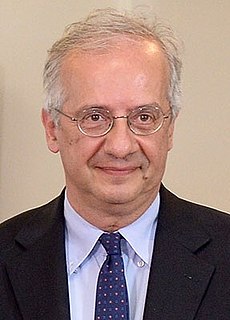
Walter Veltroni is an Italian writer, film director, journalist, and politician, who served as the first leader of the Democratic Party within the centre-left opposition, until his resignation on 17 February 2009. He served as Mayor of Rome from June 2001 to February 2008.
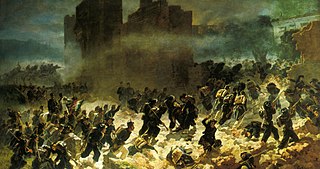
The Capture of Rome on September 20, 1870, was the final event of the long process of Italian unification also known as the Risorgimento, marking both the final defeat of the Papal States under Pope Pius IX and the unification of the Italian peninsula under King Victor Emmanuel II of the House of Savoy.

The Years of Lead is a term used for a period of social and political turmoil in Italy that lasted from the late 1960s until the late 1980s, marked by a wave of both far-left and far-right incidents of political terrorism.

The history of Rome includes the history of the city of Rome as well as the civilisation of ancient Rome. Roman history has been influential on the modern world, especially in the history of the Catholic Church, and Roman law has influenced many modern legal systems. Roman history can be divided into the following periods:

Matteo Maria Zuppi is an Italian prelate of the Catholic Church who has been Archbishop of Bologna since 12 December 2015.

Angelo De Donatis is an Italian Catholic prelate who currently serves as Cardinal Vicar, Archpriest of the Archbasilica of St. John Lateran, and Grand Chancellor of the Pontifical Lateran University.




















